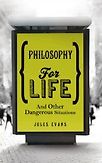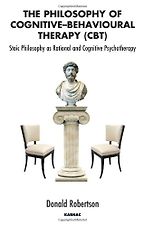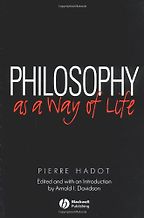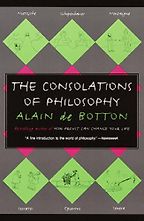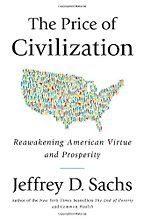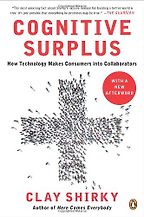For many, ancient philosophy seems to be something which is completely removed from modern life. What first got you interested in the ancient philosophers?
I got into philosophy through cognitive therapy. In my late teens and early twenties, when I was at university, I suffered from depression and anxiety. Eventually I heard about this type of therapy which was apparently good at treating that sort of thing. It was called cognitive behavioural therapy. It suggests that our emotions are to some extent caused by our beliefs and attitudes. If we become aware of our unconscious beliefs and the way that we interpret the world, we can see how that leads to our emotions. So if we change the way we interpret the world, we will also feel different.
I went along to a CBT support group, and it worked quite quickly. I stopped having panic attacks, my moods improved and it got me on the road back to health. So I started to research what this therapy was. It was invented by two American psychologists called Aaron Beck and Albert Ellis. In the 1950s they had both turned from psychoanalysis to ancient philosophy for inspiration, particularly to Socrates and the Stoics – who were the first in Western culture to argue that our emotions follow our beliefs. It fascinated me that this form of therapy, which is now so widely used, should have come so directly from ancient philosophy. It made me completely re-evaluate ancient philosophy and its usefulness in modern life.
That ties in well with your first choice, where Donald Robertson argues for a connection between CBT and ancient philosophy.
The founders of CBT were directly inspired by ancient Greek philosophy. Unfortunately, not many people are aware of that connection at all. Even a lot of cognitive therapists are unaware of it. That is partly because Aaron Beck was keen to present CBT as an evidence-based scientific therapy, so the philosophical roots of CBT were somewhat swept under the carpet. Donald’s was really the first book to properly explore the relationship between ancient philosophy and CBT. Donald runs one of the main CBT schools in the UK, and he wonderfully brings together a scientific thoroughness and a scholarly appreciation for the intelligence and beauty of some of the original philosophical material.
In what way can the book specifically help therapists with their work?
CBT takes a lot of great things from ancient philosophy. But there is a value in also going back to the original material, because there are other techniques and exercises that the ancients used which CBT doesn’t yet use, like certain visualisation techniques for example. Another value of going back to the original material – as Donald does – is that it is so beautifully written. It is much better written than a lot of modern CBT books. So you can either read something quite recent and not that well written, or you can go back and read Plato, Marcus Aurelius or Lucretius, some of the greatest writers ever.
Do you think the majority of psychotherapists are resistant to the idea that CBT is based in philosophy, or do you feel it is something that they think can enhance their work?
I don’t think they are resistant to it at all. It’s just that a lot of them aren’t aware of it. I think more and more psychologists are really interested in the links of their work to philosophy. They are aware that sometimes CBT can be instrumental and technocratic, and that there are more interesting, broader questions about what it means to live a good life that are worth exploring. The same is true on the philosophy side. More and more philosophers are interested in how modern psychologists are trying to test out some of the ancient philosophical techniques for wellbeing.
Your next choice, Philosophy as a Way of Life, gives us an interesting perspective on the history of spiritual exercises, from Socrates to early Christianity.
Pierre Hadot is not that well known, but the people who are aware of him really love and value his work. He was a French academic, a specialist in Neo-Platonist mysticism. One day he went into his local bakery, looked around at the people queuing for bread and thought: Neo-Platonist mysticism means nothing to these people and is not much use to them. So he started to become interested in the more practical philosophy of the Stoics and the Epicureans, and this idea of ancient philosophy not as abstract theory but as a way of life, something that ordinary people can practise every day to live better and happier lives.
That idea of philosophy as a way of life and a set of daily practices is one way to get more people into philosophy. One of the reasons why people today are so into Buddhism or yoga is because it gives them something they can practise every day.
What kind of spiritual exercise from the ancient philosophers did he think would still be useful in today’s modern world?
One thing Hadot wrote about was the idea of keeping a journal. At the end of each day some ancient philosophers would keep track of what happened during the day – what they did well and what they did badly. The idea is that if you want to change yourself and get rid of bad habits, first you have to track yourself. Humans are such forgetful and unconscious creatures, we don’t always realise who we are or how we’re behaving. So we need to keep track of ourselves. Epictetus, for example, said if you have a bad temper count the days on which you don’t lose your temper, and if you manage to do it for 30 days then you can consider yourself to be making progress.
Using a thought journal is a technique that CBT has brought back. If you have depression or anxiety and go and see a cognitive therapist, they will suggest that you keep a journal and keep track of your thoughts and habits, to bring more self-awareness into it and also so you can see the progress that you are making. You might have a day that you feel really down but you can look back and see that actually you have made a lot of progress from, say, three months ago.
So that is one practical exercise which the ancients used that is really useful today. In fact, we are actively developing this technique today. Now there is a lot of new technology such as phone apps which we can use to track ourselves. There is a movement called the Quantified Self, where people develop different devices to keep track of themselves, their diet, their exercise regimes, their moods, their daily activities. Their motto is “self-knowledge through numbers”, which is a very Socratic idea.
You have just written a book which gives some interesting case studies showing just how people from all walks of life have been helped by many different ancient philosophers. What is your favourite example of that?
One of things I write about is the technique in ancient philosophy of choosing your role models, known as the exemplum technique. This is the idea that if you really want to take on board an ethical idea it helps if, rather than just considering it abstractly, you think about someone who really embodies that idea or that value. Then you can see that person as a role model and try to emulate them. This is very much the approach of Plutarch, a Greek philosopher and historian. He was aware to what extent we imitate the people around us. We are always consciously and unconsciously copying the behaviour of people around us, so he suggests we try to do this more consciously. We should soak our imaginations in good role models – and he tried to provide such ethical role models in his book Parallel Lives.
I thought of this when I interviewed someone called Louis Ferrante. Louis grew up in a bad neighbourhood in New York and the roles models in his environment were all gangsters. They were all the people who had the power, success and money. So he became a gangster. He joined John Gotti’s mafia gang and by the age of 20 he was quite a successful hijacker, making lots of money, getting the best tables at restaurants and so on. Then he got busted and sent to a high-security prison when he was 22.
At one stage the prison guard told him he was nothing but an animal. He was in solitary confinement, getting his food through a slot in the door. And he thought, I really am an animal. He looked at some of the people he had thought were role models, like John Gotti, and he said it was like seeing Caesar without his cloak. So he taught himself to read and came across the book Plutarch’s Lives in the prison library, which had stories of great figures from history like Caesar. He was so taken by this book that he stole it from the library. Then he felt bad about stealing it and brought it back. He was inspired by all the stories of people from history who had done incredible things, and had often gone through situations that were worse than his. He started reading biographies of people like Nelson Mandela, and he says that experience of finding better role models saved him. He got out of prison and became a campaigner for literacy in prison. That is just one story I really like which shows ancient philosophy in action in today’s world.
Alain de Botton has been dubbed a philosophical agony uncle, and has done much to make philosophy popular.
I think of the revival of ancient philosophy as happening in three waves. The first wave was in the 1950s through people like Albert Ellis and Aaron Beck, how they rescued ancient philosophy and bought it back into psychotherapy. Then there was the second wave of people in academic philosophy, led by people like Pierre Hadot, who returned to the idea of philosophy as a way of life. The third wave, which has been around since 2000, was led by Alain de Botton, and it was about making ancient philosophy popular and accessible to ordinary people.
The Consolations of Philosophy, his third book, introduced to the mass market the ideas of philosophers such as Seneca, Montaigne and Nietzsche. And it was a best seller. But academic philosophers were horrified. They accused him of dumbing down philosophy and turning it into self-help. If you look back at some of the reviews of that book, they were really vicious. But I think he was absolutely right. If you read the Stoics or Epicureans or even Plato, they say that the aim of philosophy is to make people happier and more fulfilled. And I think Alain de Botton won that argument. If you now look at where philosophy is 10 years on, it is much more concerned with things like flourishing, happiness and the good life.
That is also true for academic philosophy, which has shifted in the direction that he went. For example, Yale university now does a course in the philosophy and psychology of the good life. Stanford does a course in the art of living. American academic philosophy has moved much more in that direction too, with the work of philosophers like Michael Sandel or Martha Nussbaum. The idea that philosophy should enable us to live happier and better lives is much more common today.
But academic philosophy in Britain is in real trouble in comparison. Far fewer people are studying it both at A level and university level. Many philosophy departments are being closed in British universities, and if there is going to be a revival in British academic philosophy then it needs to connect with people’s aspirations and get back to that original mission of helping people lead better lives. There is a lot to be learnt from de Botton, if academics can just get the sneers off their faces.
Thinking about this idea of the good life – how can ancient philosophy help us to have one?
We all have values and a model of the good life that we follow throughout life, but often our model of the good life is unconscious. We picked it up unconsciously from our childhood, our friends, what we happen to watch on TV or the music we listen to. And often our unconscious life philosophy won’t work for us. If you have a bad life philosophy, it can really mess you up. But the amazing thing about being a human is that we have the capacity to reflect on our unconscious values, and consider if they are working for us. If they are not, we can choose different values and a different course in life.
Philosophy at is simplest is that fundamental human process of thinking about the coordinates in our automatic GPS, and whether it is working for us. Why is it that we keep on crashing? Maybe we can choose a better path in life. That is something which we all do naturally, and it is fundamental to being human. The benefit of actually studying philosophy or reading it is that it helps us to do this natural activity a bit more consciously and articulately. And it introduces us to the ideas of people who thought really clearly about what is worth seeking in life.
Next up, The Price of Civilisation by Jeffrey Sachs explores what we need in an age of globalisation and economic crisis.
We have talked about how there has been a revival of ancient philosophy in modern psychology. One of the things that really fascinates me is how that is feeding into public policy and politics. Ancient philosophy offered a form of self-help, but it wasn’t just for individuals, it was also communal and political. Some ancient philosophers thought about what governments can do to help their citizens find fulfilment. You find that idea in Aristotle. His Nicomachean Ethics are all about how individuals can seek fulfilment, and it feeds directly into his Politics, which asks what the best form of society is to help people achieve that fulfilment.
The idea that governments have a role in helping us find happiness was very unfashionable for several decades, because it was seen as a recipe for tyranny. Just think about how the communist governments in Russia or China insisted that they knew best how to help their people find fulfilment and positive liberty, and the sort of tyranny that led to. Liberal philosophers like Sir Karl Popper, Sir Isaiah Berlin and John Stuart Mill insisted that we should be free to pursue our own version of the good life in our own way. Everyone has a different idea of happiness so the government should just stay out of it, they thought. But in the last few years, governments – encouraged by the psychology and philosophy of wellbeing – have decided that they should get back into the business of trying to help their citizens become happier.
This is the politics of wellbeing?
Exactly. But how can a government know if they are actually enhancing the wellbeing of their citizens? One answer governments have tried to come up with is to start measuring our national wellbeing – as the British government started to do in 2011.
That is a very difficult thing to do, given that we are all individuals with different ideas about what wellbeing is.
I agree, and this is partly what Jeffery Sachs’s book is about. He says that we need to look back to the wisdom of philosophers of the past to re-find our collective moral compass – particularly to thinkers like the Buddha and Aristotle. He thinks that national wellbeing measurements are a way for governments to re-find their moral purpose. So rather than just pursuing GDP we can try and enhance wellbeing. Other economists have argued the same thing, but it is interesting that Sachs should come out and say this because he was a key philosopher in neo-liberalism in the 1980s and 1990s, which was very free market and focused on the bottom line of GDP. So it is a real sign of the times that such an influential economist should have said we need to go back to Aristotle and start measuring national wellbeing.
It is a very much a phenomena in British politics as well. The coalition government is full of Aristotelians. Oliver Letwin, David Willetts and I think David Cameron himself are all Aristotelians. On the one hand, it’s quite exciting that suddenly these philosophical ideas of the good life should be at the heart of public policy. But it’s also quite weird that we now have the Office of National Statistics going around trying to measure our eudaimonia, which is the word the Greeks used for fulfilment or meaningful happiness.
The problem as I see it is that there are different ways to define happiness and wellbeing. The Office of National Statistics has said: “We know there is more than one way to define it, so we will measure both the utilitarian definition of wellbeing, by asking people how happy they are, and also the Aristotelian definition, by asking people how worthwhile they feel their life is.” But of course there are many more than just two ways to define wellbeing. I think people should be empowered to explore the different definitions of wellbeing, rather than forced down one path. We have to be careful to find the right balance between the [ancient] Greeks’ idea of the good life and our liberal right to choose our own path.
Finally you have chosen Cognitive Surplus.
Clay Shirky’s book isn’t really about ancient philosophy, but explores one of the reasons why there is a revival of community philosophy today. As discussed, there is the rediscovery of the ancients’ idea of philosophy as a therapeutic way of life, and this naturally leads to questions of community. Ancient philosophy wasn’t just individual self help. It was very social and communal. The Stoics would gather together under the Colonnade in their Athenian marketplace to talk about philosophy, the Epicureans lived together in a commune called “the Garden” outside Athens, the Aristotelians had their own community called the Lyceum, and so on.
Five Books interviews are expensive to produce. If you're enjoying this interview, please support us by donating a small amount.
As we return to this idea today, we’re starting to ask what is the best way to bring people together to practise philosophy communally? Alain de Botton came up with one answer, which was to set up The School of Life in London. Another part of the answer is the Internet, which is bringing people together online and offline to share ideas, and to discuss, debate and practise philosophy. You have Facebook groups, Yahoo groups and meet-up groups like the London Philosophy Club, a philosophy group that I am involved with.
Which is growing, despite the fact that less people are doing philosophy for A levels or at university in the UK.
Yes, it is. Practical philosophy is booming outside of schools and universities. There is a huge demand for it. To go back to Clay Shirky’s book, it talks about how our culture has been transformed by the shift from TV to the Internet as the main media source. In his view – and I think it is correct – we have gone from the passive consumption of culture to a much more active, involved and engaged consumption and co-production of culture.
He suggests, for example, that the TV sitcom was the opiate of our culture for several decades. We didn’t have genuine communities, which is why we got into things like Friends or Cheers – because it gave us a virtual community we could watch. But the Internet creates more engaged and co-productive communities. It has led to the re-creation of what [German sociologist] Jürgen Habermas calls the public sphere, like the Athenian marketplace or 18th century coffee houses. That is one of the reasons why there is this revival of community philosophy today, because through the Internet it is much easier to get together with other people, and to get involved in philosophy rather than just watching an academic pontificate on television. People wonder why philosophy isn’t on TV. The main reason is because everyone is out doing it.
Do you think the pace of the digital age necessitates any particular philosophy?
I think there are some types of philosophy that probably fit with the Internet age better than others. The more practical it is, the better. Also, the more it is embodied in real life stories the better. People respond better to that, which is why the ancients would often tell the lives of philosophers. Look at the success of Michael Sandel, who is the leading public philosopher today. His lectures on justice are a huge Internet hit. Part of that is because he is so good at engaging his audience. He doesn’t just talk for half an hour. Instead he gets his audience to debate certain types of ethical problems.
Do you think people are starting to use philosophy as an alternative to following a traditional type of religion?
Some philosophies are theistic, so it doesn’t have to be either/or. In Catholic universities in America, philosophy is compulsory. Several of the leading philosophers today are Catholics, like Charles Taylor and Alasdair MacIntyre. But for many it is an alternative to organised religions. For example, the Skeptics is a grassroots movement with several million members. I visited their annual conference in Las Vegas called The Amaz!ng Meeting, where they hang out and listen to speakers like Richard Dawkins, then go back home to spread the word.
Get the weekly Five Books newsletter
If philosophy is going to be a genuine alternative to something like Christianity, it is really about creating forms of community that bind people together. There is a very interesting study by an anthropologist called Richard Sosis about which communities lasted longest in 19th century America. He found that those communes which demanded more from their members lasted a lot longer – and religious communes, probably for that reason, lasted longer than secular communes. If philosophy wants to be an alternative to religion, then the question is how much can philosophical communities demand of their members without turning people off or being accused of being cults.
Again, it’s the question of trying to find a balance between the ancient idea of the good life, and our modern liberal insistence on being free to follow our own path. Liberals are always loitering at the door of communities, afraid to commit. We crave for community, but we’re commitment-phobes.
Five Books aims to keep its book recommendations and interviews up to date. If you are the interviewee and would like to update your choice of books (or even just what you say about them) please email us at [email protected]

